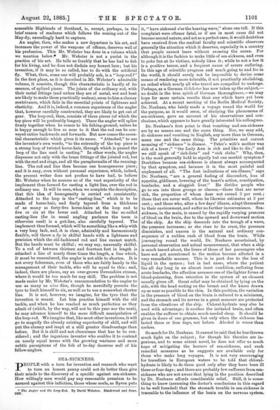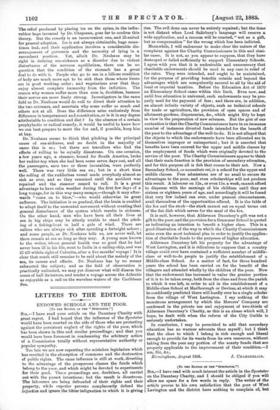SE A- SICKNE S S.
PEOPLE with a turn for invention and research who want to turn an honest penny could not do better than give their minds to the discovery of a specific against sea-sickness. How willingly men would pay any reasonable premium to be assured against this infliction, those whose souls, as Byron puts • The Angler and the .Loop-Rod. By David Webster. Blackwood and Sons. it, " have sickened o'er the heaving wave," alone can tell. If this complaint were oftener fatal, or if use in most cases did not become second nature, and act as a perfect cure, it would doubtless have received from the medical faculty and scientific observers generally the attention which it deserves, especially in a country that people cannot leave without crossing the ocean. For although it is the fashion to make little of sea-sickness, and even to poke fun at its victims, nobody likes it ; while to not a few it is a. positive terror, and a frequent cause of severe suffering. In this age of scientific progress and much going to and fro in the world, it should surely not be impossible to devise some means of rendering more tolerable, if not practically abolishing, an ordeal which nearly all who travel are compelled to undergo. Perhaps, as a German Gelehrter has now taken up the subject,— no doubt in the true spirit of German thoroughness,—we may hope for more certain results than any which have yet been achieved. At a recent meeting of the Berlin Medical Society, Dr. Neuhaus, who lately made a voyage round the world for the purpose, as it would seem, of studying the phenomena of sea-sickness, gave an account of his observations and con- clusions, which appears to have greatly interested his colleagues.
Dr. Nenhaus's first point is that vomiting and sea-sickness are by no means one and the same thing. Nor, we may add, do sickness and vomiting in English, any more than in German, mean one and the same thing. The primitive and correct meaning of " sickness " is disease. " Peter's wife's mother was sick of a fever ;" "the Lady Ann is sick and like to die ;" and we still speak of " sick-lists" and " sick clubs." Why, then, is the word generally held to signify but one morbid symptom ? Doubtless because sea-sickness is almost always accompanied by that symptom, and because it is the most painful and unpleasant of all. "The first indications of sea-illness," says Dr. Neuhaus, "are a general feeling of discomfort, loss of appetite, giddiness, lowering of the heart's action, constipation, headache, and a sluggish liver." He divides people who go to sea into three groups or classes,—those that are never sick, the proportion of whom does not exceed 3 per cent. ; those that are never well, whom he likewise estimates at 3 per cent. ; and those who, after a few days' illness, adapt themselves to their environment, and suffer no further inconvenience. Sea- sickness, in the main, is caused by the rapidly varying pressure of blood on the brain, due to the upward and downward motion of the ship. As the ship descends into the trough of a wave, the pressure increases ; as she rises to its crest, the pressure diminishes, and nausea is the natural and ordinary con- sequence of a sudden rush of blood from the brain. While journeying round the world, Dr. Neuhaus ascertained, by personal observation and actual measurement, that when a ship is much tossed about, the livers of those of her passengers who have not got accustomed to the motion become affected in a very remarkable manner. This is in part due to the loss of liquid in the system ; bat in bad cases, where the patient lies all day long in an almost inert condition, suffering from acute headache, the affection assumes one of the lighter forma of blood-poisoning, from retention in the system of an element usually given off. Great relief may be obtained by lying on the side, with the head resting on the breast and the knees drawn up as near as possible to the chin. In this position, the variation in the pressure of blood on the brain is reduced to a minimum, and the stomach and its nerves in a great measure are protected from the vibrations of the ship. Chloral-hydrate may also be used with advantage ; it soothes the irritated brain, and often enables the sufferer to obtain much-needed sleep. It should be given in doses of one gramme, but only when the sickness has lasted three or four days, not before. Alcohol is worse than useless.
So much for Dr. Neuhaus. It cannot be said that he has thrown much light on the subject ; for though his theories are in- 'genions, and to some extent novel, he does not offer us much hope of mitigating the horrors of sea-sickness, and such remedial measures as he suggests are available only for those who make long voyages. It is not very encouraging for travellers in European waters to be told that chloral- hydrate is likely to do them good only after they have been ill three or four days ; and there are probably few sufferers from sea- sickness who are not aware that lying in the position described by Dr. Neuhaus affords considerable relief. Still, it is some- thing to know (assuming the doctor's conclusions in this regard to be well founded) that the stomach trouble in sea-sickness is traceable to the influence of the brain on the nervous system.
The relief produced by placing ice on the spine, in the india- rubber bags invented by Dr. Chapman, goes far to confirm this theory. But the remedy is an inconvenient one, and ill-suited for general adoption. Ice is not always obtainable, bags some- times leak, and their application involves a considerable dis- arrangement of garments and the necessity of lying in a recumbent position. Yet, albeit Dr. Neuhaus may be right in defining sea-sickness as a disorder due to violent disturbance of the nervous equilibrium, there can be no question that the condition of the stomach has a great deal to do with it. People who go to sea in a bilious condition of body are much more apt to be sick than those whose livers are in good working order ; and vegetarians aver that they enjoy almost complete immunity from the infliction. The reason why women suffer more than men is, doubtless, because their nerves are more finely strung. Investigators in the same field as Dr. Neuhaus would do well to direct their attention to the two extremes, and ascertain why some suffer so much and others not at all. Does the difference arise exclusively from difference in temperament and constitution, or is it in any degree attributable to condition and diet ? In the absence of a certain prophylactic or radical remedy, it would be useful to know how we can best prepare to meet the foe and, if possible, keep him at bay.
Dr. Neuhaus seems to think that pitching is the principal cause of sea-sickness, and no doubt in the majority of cases this is so ; but there are travellers who find the effects of rolling to be eqUally disastrous. On one occasion, a few years ago, a steamer, bound for South America, broke her rudder-top when she had been some seven days out, and all the passengers, save two or three incurables, were perfectly well. There was very little sea on; but in a short time the rolling of the rudderless vessel made everybody almost as sick as ever, and so they remained until the accident was repaired and the steamer ceased to roll. It is a great advantage to have calm weather during the first few days of a long voyage, for in this way many escape,—though it may after- wards "come on to blow,"—who would otherwise be great sufferers. The initiation is so gradual, that the brain is enabled to adapt itself to the unwonted movement without creating that general disturbance of the system which results in sickness. On the other hand, men who have been all their lives at sea in big ships may be utterly unable to stand the pitch- ing of a fishing-boat in half a gale of wind. There are sailors who are always sick after spending a fortnight ashore ; and some people, as Dr. Neuhaus tells us, are never well, let them remain at sea as long as they may. A young man known to the writer, whose general health was so good that he had never been ill in his life, went to India in a sailing-ship, and was ill till within sight of Calcutta, after a five months' voyage ! It is clear that much still remains to be said about the malady of the sea, its causes and effects. Dr. Neuhaus has by no means exhausted the subject; and as the field of observation is practically unlimited, we may yet discover what will disarm the ocean of half its terrors, and render a voyage across the Atlantic as enjoyable as a sail on the waveless waters of the Caribbean Sea.



































 Previous page
Previous page